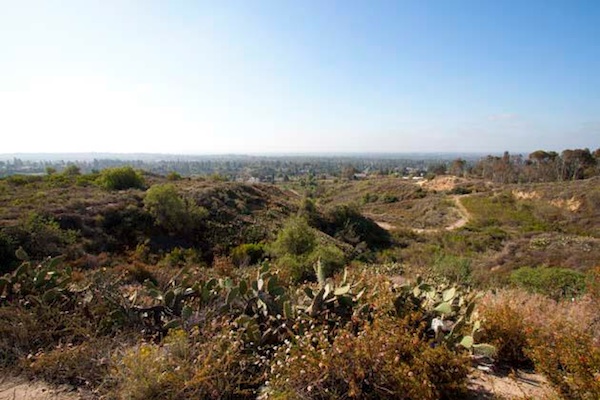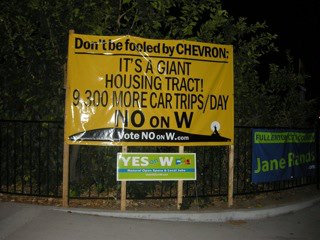
In a political landscape dominated by corporate spending, it’s a rare event when a small citizens group and a community can exert their political will over a behemoth corporation used to having its way. The Sierra Club Coyote Hills Task Force and Friends of Coyote Hills everaged the political capital built over a decade of educating and engaging the community on the issue of saving this last precious natural open space in Fullerton. Where once the committee was criticized as a small isolated group that didn't represent the mainstream public interest of the community, the result of a ballot initiative in November has put that myth to rest.
In a classic example of David versus Goliath, Chevron Corp. had been pushing a plan to develop 760 homes in the West Coyote Hills, a 510-acre natural open space in Fullerton. Despite the oil company pumping $1.5 million into a local city election and retaining a top campaign management firm that claimed a 95% success rate, the voters of Fullerton, led by the task force, handily rejected Chevron’s development plan for West Coyote Hills with a 61% vote. The victory over what was called Measure W was won using a tiny budget by comparison of about $60,000 and old-fashioned “shoe leather.”
Creating a robust campaign
How did this happen? Fullerton is a city with a population of 135,161 located in the north part of a traditionally conservative Orange County. The task force has been working since 1997 to save all of West Coyote Hills as a park and preserve for now and the future. From 2003 to 2008, we worked with our attorneys to critique four revisions of the Draft Environment Impact Report for planned development.
In 2012, the matter finally came before the Fullerton City Council, which rejected Chevron’s development plan with a 3-2 vote. This surprise victory was short-lived as Chevron, using the threat of lawsuit, bullied a new City Council into approving the same development plan in July 2011. The task force then mobilized volunteers to gather more than 10,000 signatures from Fullerton voters, qualifying the Development Agreement for a referendum vote this past November.
 Votes are tallied on Measure W
Votes are tallied on Measure W
The election odds were daunting. Chevron hired top-notch marketing and PR consultants to reach out to voters using just about every communication channel available including TV commercials, internet ads, YouTube videos, yard signs, mailers, slate mailers, newspaper ads, phone banks, and door-to-door canvassers. Voters were inundated with daily advertisements from Chevron. Chevron also sent door-to-door canvassers to repeatedly visit homeowners until they secured their support.
Chevron’s campaign attempted to confuse voters into thinking Measure W was a parks measure, not a housing development. Right before the election, they lobbied the Fullerton City Council to change the measure title to include the phrase “Nature Preserve.” They made campaign contributions to City Council candidates to support their campaign. They also made donations to schools to gain their public support. Chevron’s position was endorsed by Orange County’s conservative newspaper too. In one publicity ploy gone awry, they retracted the use of the Sierra Club name from their advertisements when a purported endorser was found to have signed up for membership right before Chevron’s ads began.
But the task force prevailed. As in the case of referendums, victory brings us one huge step closer to our preservation goal, but the work to save Coyote Hills may not be finished here. Chevron can return in a year with another development plan to face what we hope will be a more emboldened, enlightened and representative Fullerton City Council. Although task force members and activists stand ready for that next step, it's hopedthat Chevron will instead see the wisdom of cooperating with the community now to sell West Coyote Hills for a park at a fair market value.
Angela Lindstrom is a member of the Sierra Club Coyote Hills Task Force and the Friends of Coyote Hills who worked on the No on W campaign.